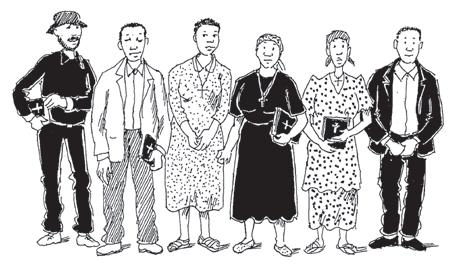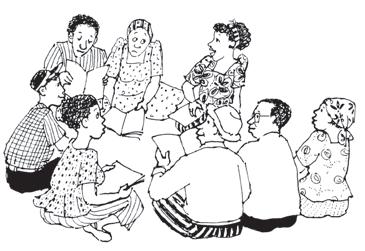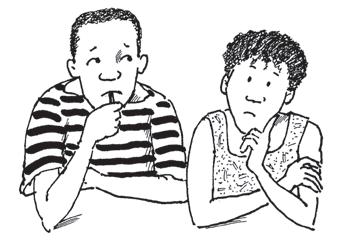
5 minute read
Glossary
from Hands in Hand
adult
attitude
Advertisement
belief
blame
child
confidentiality
counselling
denial
disclosure
discrimination
equality
facilitator
female genital mutilation/cutting
forced marriage
forgiveness
Any person aged 18 years and older.
Opinion, feeling or position about people, events and/or things that is formed as a result of one’s beliefs. Attitudes influence behaviour.
An idea that is accepted as true. It may or may not be supported by facts. Beliefs may stem from or be influenced by religion, education, culture and personal experience.
When you feel or declare that someone or something is responsible for the sexual violence.
Any person under the age of 18.
Confidentiality means that information that has been shared must be kept private, and you agree only to share information about a person with their permission. Confidentiality is an ethical principle that is associated with medical and social service professions. All written information is maintained in a confidential place in locked files and only non-identifying information is written down on case files. Maintaining confidentiality means that case details are never discussed with family or friends, or with colleagues whose knowledge of the information is not necessary. The exception to maintaining confidentiality is only in the case of a disclosure of harm to oneself or to others or if children are at risk.
The provision of professional assistance and guidance in resolving emotional, personal or psychological problems.
Refusing to accept something that has happened is true. Survivors of sexual violence may not want to accept that they are being abused, because they are afraid of the consequences.
The process of revealing information. Disclosure in the context of sexual abuse refers specifically to how a non-offending person (for example, a friend or church pastor) learns about an individual’s experience of sexual violence. Individuals will disclose sexual violence experiences differently and disclosure is often a process rather than a single or specific event. Disclosure about sexual violence can be directly or indirectly communicated, voluntarily or involuntarily.
To treat someone differently and worse than others because of who they are and what they have experienced. Survivors of sexual violence can be discriminated against (or made to feel unwelcome) within their own families and churches.
This is about making sure people are treated fairly and given fair chances. Equality is not about treating everyone in the same way, but it recognises that their needs are met in different ways. Promoting equality should remove discrimination in the areas of race, gender, disability, religion or belief, sexual orientation and age.
A leader who encourages others to share their knowledge, experience and thinking so that people can learn through sharing together.
Practice involving the removal of a girl's external genitals and sometimes sewing of the vaginal opening. This can take place when a girl is still a baby, during childhood, adolescence or at time of marriage.
A marriage in which one or both of the people are married without his or her consent or against their will. Forced child marriage is where a girl is forced to marry early; it usually means the end of her education if she is in school and the end of her being able to make important decisions about work, her health and her well-being. Abuse is common in child marriages.
This is letting go of the need for revenge and releasing negative thoughts of bitterness and resentment.
gender
gender-based violence
harmful traditional practices
inclusion
leadership
perpetrator
rape
reporting
safe space
self-stigma
sexual exploitation
stereotype
stigma
submission
survivor
trauma
The non-biological differences between men and women; the widely shared ideas and expectations that define women and men in a given society. Such ideas include the differences in dress, behaviour, status and roles. These commonly shared expectations guide the behaviour of women and men (rather than the sexual differences which are biological).
This refers to any harmful act that is perpetrated against a person’s will; it is based on socially ascribed (gender) differences between males and females. Gender-based violence encompasses a wide range of human rights violations, including sexual abuse, rape, domestic violence, sexual assault and harassment, trafficking of women and girls and several harmful traditional practices, including forced early marriage.
These are cultural and religious traditions that are harmful physically or emotionally to the individuals involved.
The action of including or of being included within a group or structure.
The action of leading a group of people, organisation or church, or the ability to do this.
A person who directly inflicts or supports violence or other abuse inflicted on another against his/her will.
Any act of non-consenting sexual intercourse, ie forcing a person to have sex against their wishes.
The action of going to the police and providing a statement and evidence that sexual violence has occurred.
A place where anyone can relax and be able to express themselves fully, without fear of being made to feel uncomfortable, unwelcome or unsafe.
The feeling that we are unworthy and shameful. Survivors of sexual violence may feel unworthy or ashamed and stigmatise themselves. This often means that they will be afraid to report what has happened because of fear of being judged.
Any actual or attempted abuse of a position of vulnerability, differential power or trust for sexual purposes. This includes profiting monetarily, socially or politically from the sexual exploitation of another.
Ideas about something or someone that have become fixed through being widely used, but which do not necessarily apply in every case.
A mark of disgrace or disapproval associated with a particular circumstance, quality or behaviour of a person. A person experiencing stigma from the people around him/her can lead this person to feel socially unacceptable, resulting in isolation, rejection and shame. Stigma manifests itself through the disapproval, condemnation and rejection of survivors of sexual violence.
The action of accepting or yielding to a superior force or to the will or authority of another person.
A person who has survived/experienced sexual violence. The term ‘survivor’ can be used interchangeably with the term ‘victim’; however, the term ‘victim’ has more negative associations. Throughout this resource, we use ‘survivor’.
Traumatic experiences usually accompany a serious threat or harm to an individual’s life or physical well-being and/or a serious threat or harm to the life or physical well-being of the individual’s child, spouse, relative or close friend. When people experience a disturbance to their basic psychological needs (safety, trust, independence, power, intimacy and esteem), they experience psychological trauma.







